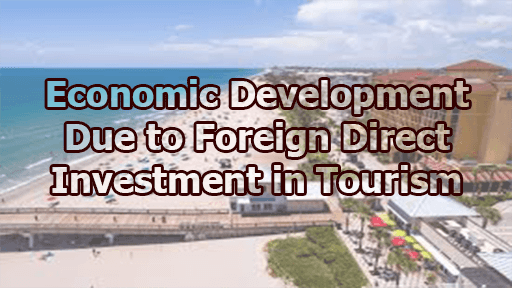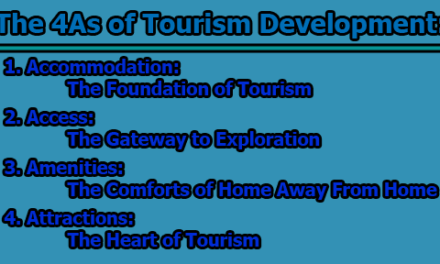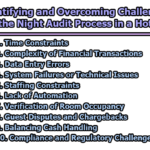Economic Development Due to Foreign Direct Investment in Tourism:
Foreign Direct Investment (FDI) has emerged as a key driver of economic development in many countries, fostering growth in various sectors. The tourism industry, in particular, has significantly benefitted from FDI, leading to increased economic development. This article will explore the economic development due to Foreign Direct Investment in tourism.
Section 1: Foreign Direct Investment (FDI) in Tourism:
1.1 Defining FDI: Foreign Direct Investment (FDI) is a multifaceted financial arrangement involving a resident entity in one country (the home country) establishing a significant ownership stake in a business enterprise located in another country (the host country). This ownership stake typically comes with various degrees of control, the ability to influence company policies, and the intent for long-term engagement. FDI can take several forms, including mergers and acquisitions (M&A), joint ventures, and the establishment of wholly-owned subsidiaries.
Foreign Direct Investment plays a pivotal role in international business and global economic development. It represents a form of cross-border capital flow that contributes to both the investor’s interests and the host country’s economic growth. Within the context of the tourism industry, FDI plays an especially crucial role, as it aids in the development and expansion of tourism-related businesses and infrastructure.
1.2 The Tourism Industry and FDI: The tourism industry is a diverse and multifaceted sector that includes various activities and services catering to tourists. FDI in tourism has the potential to take on different forms, each with a unique impact on the industry. Below, we explore these forms in detail:
1.2.1 Hotel and Resort Development: International hotel chains are among the prominent players in the tourism sector that frequently engage in FDI activities. They invest capital in the construction and operation of hotels and resorts in foreign countries. This often involves the development of new properties or the acquisition of existing ones. These investments aim to cater to the increasing demand from international travelers looking for comfortable and standardized accommodation options.
Benefits:
- Quality Standards: International hotel chains are known for their high-quality standards, which are brought to host countries, elevating the overall quality of accommodations.
- Employment Opportunities: Hotel and resort development through FDI generates employment in both construction and ongoing operations.
Case Study: Marriott International
Marriott International, one of the world’s largest hotel chains, has undertaken numerous FDI initiatives worldwide. Their investments include constructing and operating hotels and resorts in countries such as China, India, and the Caribbean, significantly contributing to the tourism infrastructure and the local economies.
1.2.2 Transportation Infrastructure: Transportation plays a vital role in the tourism industry, facilitating the movement of tourists to and within host countries. FDI in this sector typically involves airlines, cruise lines, and other transportation companies investing in host countries to improve infrastructure and connectivity.
Benefits:
- Improved Connectivity: FDI in transportation infrastructure can lead to enhanced connectivity, making it easier for tourists to access various destinations within the host country.
- Economic Development: Investment in transportation infrastructure generates economic development through the construction and operation of airports, seaports, and transportation networks.
Case Study: Dubai International Airport
Dubai International Airport has experienced significant FDI from airlines like Emirates. This investment has transformed the airport into a global aviation hub, contributing to Dubai’s emergence as a top international tourism destination.
1.2.3 Tour Operators: Companies specializing in organizing and selling tour packages often seek to expand their reach by establishing operations in foreign countries. These entities can set up offices, partner with local agencies, or acquire existing tour operators.
Benefits:
- Local Expertise: Collaborating with local tour operators allows the transfer of local knowledge and expertise, ensuring that tourists have immersive and culturally rich experiences.
- Diversified Offerings: The involvement of foreign tour operators can result in a wider range of tour packages and experiences for tourists.
Case Study: TUI Group
TUI Group, a major European tour operator, has expanded its presence globally through FDI. They have established subsidiaries and partnerships in popular tourist destinations such as Spain, Greece, and the Caribbean, broadening their offerings and benefiting local economies.
1.2.4 Cultural and Recreational Attractions: In many countries, FDI has been instrumental in improving cultural and recreational attractions. These investments can include the construction of theme parks, the renovation of cultural heritage sites, or the enhancement of recreational facilities.
Benefits:
- Tourist Attraction: Upgrading cultural and recreational attractions increases their appeal to tourists, leading to increased visitation.
- Preservation: FDI can support the preservation and maintenance of culturally significant sites and attractions.
Case Study: The Louvre Abu Dhabi
The construction and operation of The Louvre Abu Dhabi, an art and civilization museum in the United Arab Emirates, involved significant FDI. This iconic museum has not only attracted tourists but has also contributed to the cultural and economic development of the region.
FDI in the tourism sector has a transformative effect, influencing the growth and development of various subsectors within tourism, such as hospitality, transportation, tour operations, and cultural attractions. These investments bring substantial economic benefits to both the host countries and the investors, while also enhancing the overall tourist experience. However, it is important to acknowledge that along with these benefits, there can be challenges and concerns, including issues related to cultural and environmental impacts, economic dependency, and income inequality, which necessitate careful planning and management of FDI in tourism.
Section 2: Economic Development through FDI in Tourism:
Foreign Direct Investment (FDI) in the tourism sector plays a pivotal role in the economic development of host countries. It contributes to economic growth through several key mechanisms, including infrastructure development, employment generation, and revenue enhancement.
2.1 Infrastructure Development: One of the primary ways in which FDI drives economic development in the tourism sector is by catalyzing infrastructure development. Host countries often face limitations in terms of financial resources and expertise required for the creation of the necessary infrastructure to attract and accommodate tourists. FDI addresses this gap by injecting much-needed capital into the construction and improvement of critical tourism-related infrastructure, such as hotels, airports, roads, and transportation networks. This, in turn, significantly enhances the host country’s appeal to tourists and contributes to overall economic development.
Case Study: Dubai, UAE
Dubai’s extraordinary transformation into a global tourism hub owes a substantial debt to FDI. Investors from various countries have made substantial investments in the construction of luxurious hotels, iconic structures like the Burj Khalifa, and the development of world-class airports. The resulting infrastructure has been critical in attracting millions of tourists annually, leading to remarkable economic growth for the city and the United Arab Emirates as a whole.
The benefits of infrastructure development driven by FDI are multi-fold:
- Improved Attractiveness: Enhanced infrastructure makes the host country more attractive to tourists, thus increasing the number of visitors.
- Job Creation: Infrastructure development leads to job creation not only during the construction phase but also in ongoing operation and maintenance.
- Economic Spillover: The investment in infrastructure stimulates economic spillover effects, with local businesses benefiting from increased tourist footfall.
2.2 Employment Generation: FDI in the tourism sector has a significant impact on employment, addressing a critical aspect of economic development. Tourism-related businesses, such as hotels, restaurants, and tour operators, require a substantial workforce to provide services and support the industry. FDI projects generate a multitude of employment opportunities, ranging from skilled positions in management and hospitality to service roles like housekeeping and food service. This surge in job opportunities helps reduce unemployment rates and alleviate poverty in host countries, contributing to inclusive economic growth.
Case Study: The Caribbean
Plentiful Caribbean nations have witnessed a substantial boost in employment due to FDI in the tourism industry. Cruise lines, in particular, have made significant investments in building ports and operating facilities in the region. This has led to the creation of thousands of job opportunities, directly benefiting the local population and boosting the livelihoods of communities in the region.
The advantages of employment generation through FDI in tourism are noteworthy:
- Reduction in Unemployment: FDI in tourism directly reduces unemployment rates by creating diverse job opportunities.
- Skill Development: It fosters the development of skills and expertise within the local workforce.
- Poverty Alleviation: Increased employment opportunities result in poverty alleviation, improving the living standards of the local population.
2.3 Revenue Generation: FDI in tourism not only contributes to economic development through direct investments but also significantly bolsters the host country’s revenue through various channels. Tourists, who are drawn by improved infrastructure and attractions, spend on various aspects of their visit, including accommodation, food, transportation, and entertainment. These expenditures stimulate local economies, benefitting businesses in the tourism ecosystem.
Additionally, governments can collect taxes and fees from tourists, further enhancing their revenue streams. The influx of foreign currency and investments, coupled with higher tourist spending, can lead to a balance of payments surplus for host countries, contributing to overall economic stability and growth.
Case Study: Thailand
Thailand’s tourism sector has been profoundly supported by FDI. The country’s breathtaking beaches, vibrant culture, and rich history have attracted numerous foreign investors, leading to a surge in tourist arrivals. Consequently, Thailand has consistently ranked among the top destinations for international tourists, significantly boosting its revenue and enhancing its economic development.
The advantages of revenue generation through FDI in tourism include:
- Economic Growth: Increased tourist spending bolsters local economies, leading to economic growth.
- Government Revenue: Taxes and fees collected from tourists contribute to government revenue.
- Balance of Payments Surplus: Foreign currency inflow from tourism can lead to a balance of payments surplus, contributing to economic stability.
FDI in the tourism sector is a potent driver of economic development, fostering infrastructure development, employment generation, and revenue enhancement. These benefits are instrumental in not only attracting tourists but also improving the livelihoods of local populations, ultimately leading to more inclusive and sustainable economic growth. However, it is essential for host countries to manage their tourism-related investments carefully to ensure they maximize the benefits and mitigate potential downsides while promoting responsible and sustainable tourism development.
Section 3: Challenges and Risks of FDI in Tourism:
While Foreign Direct Investment (FDI) in tourism brings substantial economic benefits, it also poses certain challenges and risks that require careful consideration and management by both host countries and foreign investors. This section delves into some of the significant challenges and risks associated with FDI in tourism, highlighting their impact on cultural, environmental, and socio-economic aspects.
3.1 Cultural and Environmental Impact: One of the most significant challenges of FDI in the tourism sector is its potential for cultural and environmental impact. The rapid development of tourist infrastructure can disrupt local traditions and damage natural resources, leading to several issues:
- Overcrowding: Popular tourist destinations may suffer from overcrowding, diminishing the experience for both tourists and local residents.
- Pollution: Increased tourism often results in higher waste generation and environmental pollution, affecting local ecosystems.
- Overdevelopment: Uncontrolled construction and urbanization can harm the natural beauty and cultural heritage of the host country.
Case Study: Bali, Indonesia
Bali’s rapid tourism growth, fueled by FDI, has strained its natural resources and led to environmental degradation. The uncontrolled construction of hotels and resorts has encroached on the island’s landscape, causing significant harm to its natural beauty. Additionally, the influx of tourists has disrupted traditional Balinese culture, leading to concerns about cultural erosion.
Addressing these challenges necessitates responsible and sustainable tourism development, which includes regulations, infrastructure planning, and efforts to protect cultural heritage and natural resources.
3.2 Dependency on Tourism: Over-reliance on tourism, especially when driven by FDI, can make a host country highly vulnerable to economic fluctuations. Such dependence can create several risks:
- Economic Vulnerability: Host countries can become highly susceptible to external factors such as natural disasters, political instability, or changes in global travel trends that affect tourism revenue.
- Income Disparities: When a significant portion of the economy is tied to tourism, income disparities can increase, with the benefits concentrated in specific regions and industries.
Case Study: Maldives
The Maldives, renowned for its exclusive island resorts and driven by FDI in the tourism sector, has become heavily reliant on tourism revenue. However, the nation faces long-term threats due to climate change and rising sea levels, which can severely impact its tourism-dependent economy.
Mitigating the risks of over-dependence on tourism involves diversifying the economy, investing in other sectors, and developing strategies for sustainable tourism that can withstand external shocks.
3.3 Inequality and Leakage: A notable risk of FDI in tourism is the potential for income inequality and revenue leakage. While FDI brings economic benefits, they do not always reach the local population equally. Income inequality can result when the majority of profits flow back to foreign investors or large corporations, leaving local communities with minimal gains. Leakage, on the other hand, occurs when the revenue generated from tourism, including foreign exchange earnings, leaks out of the host country due to foreign-owned businesses.
Case Study: The Dominican Republic
The Dominican Republic has experienced substantial FDI in its tourism sector, particularly in the form of international hotel chains. However, a significant portion of the profits has gone to these foreign investors, contributing to income inequality within the country.
Addressing inequality and leakage requires policies that promote the participation of local communities and businesses in the tourism value chain, as well as transparent financial agreements and fair labor practices.
FDI in tourism presents numerous opportunities for economic development, but it also carries inherent challenges and risks. These challenges underscore the importance of responsible and sustainable tourism development, which prioritizes cultural preservation, environmental protection, and the equitable distribution of benefits among host communities. Managing these risks effectively is essential to ensure that FDI in tourism continues to drive economic growth while minimizing its negative impacts.
Section 4: FDI Promotion in Tourism:
Host countries often actively seek Foreign Direct Investment (FDI) to promote tourism and economic development. To attract foreign investors to their tourism sector, governments and relevant authorities employ various strategies, policies, and incentives. These strategies aim to create a conducive environment for FDI and make the host country an appealing destination for investors. Here are some key methods employed to promote FDI in the tourism sector:
4.1 Investment Incentives: One of the primary strategies to attract FDI in the tourism sector is to offer investment incentives. These incentives are designed to make investment in tourism-related projects more attractive to foreign investors. Some common incentives include:
- Reduced Taxation: Governments may offer reduced corporate income taxes or even tax holidays for a specified period to attract foreign investors. Lower tax rates can significantly enhance the return on investment.
- Accelerated Depreciation: Accelerated depreciation schedules allow investors to write off the cost of infrastructure and asset investments more quickly, reducing taxable income.
- Customs Exemptions: Exemptions from customs duties and import tariffs on equipment, materials, and goods used for tourism-related projects can lower the initial capital investment for investors.
- Financial Subsidies: Governments may provide financial subsidies, grants, or low-interest loans to support tourism-related FDI projects.
4.2 Simplified Regulations: A complex and burdensome regulatory environment can deter foreign investors from engaging in the tourism sector. To encourage FDI, host countries often streamline bureaucratic processes and reduce red tape. Simplified regulations make it easier for foreign investors to navigate the legal and administrative framework. Key steps in this process may include:
- Single-Window Clearance: Implementing a single-window clearance system allows foreign investors to complete all necessary approvals and permits through one streamlined process, reducing administrative burdens.
- Transparent Regulations: Clarity in regulations and transparency in administrative processes build investor confidence and make it easier for investors to understand the requirements.
- Business-Friendly Environment: Creating a business-friendly environment by minimizing unnecessary regulations and promoting ease of doing business can make a significant difference in attracting FDI.
4.3 Marketing and Promotion: Marketing and promoting the host country as an attractive destination for tourism-related FDI is another critical strategy. This involves showcasing the unique characteristics, natural beauty, cultural heritage, and investment opportunities of the host country to potential foreign investors. Marketing efforts may include:
- Investment Summits and Conferences: Hosting investment summits and conferences that highlight the host country’s tourism potential can attract investors and facilitate networking.
- Advertising and Promotion: Engaging in targeted advertising and promotional campaigns to showcase the host country’s attractions and investment opportunities.
- Investor Relations: Establishing dedicated investor relations offices or agencies that provide information, support, and guidance to foreign investors.
- Online Presence: Developing a strong online presence through dedicated websites, social media, and information portals to share information about investment opportunities.
4.4 Infrastructure Development: Investing in basic infrastructure, such as transportation networks, utilities, and telecommunications, is fundamental to attracting FDI in the tourism sector. Infrastructure development enhances the host country’s appeal and creates a more favorable environment for foreign investors to operate. Key areas of infrastructure development include:
- Transportation: Upgrading transportation infrastructure, including airports, seaports, roads, and public transportation, is crucial for the efficient movement of tourists and goods.
- Utilities: Ensuring reliable access to utilities, such as electricity, water, and waste management, is essential for tourism-related projects.
- Telecommunications: Providing robust and reliable telecommunications infrastructure is vital for the smooth operation of tourism businesses and services.
Investment in infrastructure not only supports tourism but also benefits the host country’s overall economic development. It increases the country’s attractiveness as a destination for both tourists and investors.
Promoting FDI in the tourism sector is a multifaceted process that involves creating an appealing investment environment, streamlining regulations, marketing the host country’s assets, and investing in critical infrastructure. By employing these strategies, host countries can harness the potential of FDI to stimulate economic growth, create employment opportunities, and improve their overall tourism offerings.
In conclusion, Foreign Direct Investment (FDI) has emerged as a powerful driver of economic development in the tourism industry. The infusion of capital into tourism-related infrastructure, employment generation, and increased revenue streams contributes to the growth of host countries. However, the challenges and risks associated with FDI in tourism, including cultural and environmental impacts, economic dependency, and income inequality, must be addressed to ensure sustainable development.
While FDI plays a pivotal role in boosting tourism, host countries should carefully manage their strategies to maximize the benefits while mitigating the potential downsides. Achieving a balance between economic growth and responsible tourism development is essential for ensuring that FDI in tourism continues to contribute positively to global economic development. By promoting sustainable and responsible practices, host countries can harness the full potential of FDI in tourism, making it a win-win for investors and the local communities alike.

Former Student at Rajshahi University










